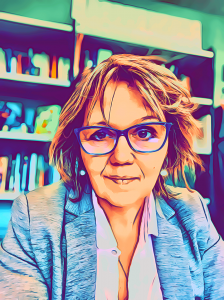151 Letter from Isabelle Frochot

What an inspiring initiative, thank you Antonia and Sara for creating this project! These letters summarize the small talks at conferences and between colleagues, and the advise we give to our PhD students, in the end, these are things that we never talk about openly. Putting them on paper and sharing them with early career researchers is such a great initiative.
In the mid-1990s, I arrived in the Scottish Highlands with my rucksack and basic operational English, with the dream to travel around the world. Somehow, I did no go further and very happily stayed in Scotland. I was already fond of research, I obtained an ESRC funding at MMU and conducted a PhD on Tourism Marketing. I then went on to work for two Scottish universities and then moved back to France. When I looked for my PhD funding, I had no British education and no connections with the world of British academia, nonetheless I felt truly welcomed and supported in this world. So, the first lesson I learned was how much supportive academia was. I have now been an academic for nearly 30 years and in this lap of time, I have learned a few other principles that early career researchers might be interested in.
Be bold
Research is fun, innovative and creative but somehow, it is also easy to conduct “boring” research by reproducing existing work in a different context or conducting elaborate statistical analysis to produce fairly evident knowledge. Learn to step out of your comfort zone, mix with different disciplines, engage into new methodological protocols, study new areas within tourism consumption: by challenging yourself you will develop your own creativity and it will conduct you to produce fun and innovative research.
Believe in serendipity
What goes around comes around: research is about sharing, about embracing diversity and ultimately about giving. If you start counting or if your eyes are obsessed with your h-index, this might not lead you down the right path. As researchers, we help each other out, we respect each other and we exist as a community. If you embrace this ethos, you might well find that you will stemple across incredibly valuable colleagues, and opportunities will come your way naturally. Do not underestimate your brain either. Your brain works h24, and sometimes it works best when you unleash it, my best research ideas have always emerged when I am cycling..
Having said that, know your priorities. Academics are passionate individuals and colleagues will come knocking on your door with another interesting research project, a new and exciting course (if not a diploma) to launch, a conference to organize (great fun but super time consuming). All of these opportunities are fun and interesting, but remember that time has become a scarce value, use it wisely.
Students are your lifeblood. Students are young, dynamic, eager to learn and a constant source of energy and positivism. Students will give back to you more than you think. If we all struggled teaching behind screens during the Covid crisis, it is because the contacts we have with students are rich and invaluable. Teaching is about giving but also receiving, it is a breath of fresh air when you are a busy researcher, and there is nothing like getting out of a class with a satisfactory feeling of having given a good lecture.
Think of your community. Research is high up somewhere but it is also deeply connected to the realities of our communities and local economies. Our research is well spread through conferences and journals but this often remains out of the public eye. Make sure you engage into public talks, open universities, write in the local press to spread your research results. It is our duties to spread our knowledge, and you will also receive valuable feedbacks from these public encounters (as long as you adapt your speech). Local communities might look at you with empty eyes if you say that you will present “a cross-disciplinary meta-analysis of benefit segmentation” or a “structural equation analysis of perceived value in a liminality context”. They might however be more receptive to a talk on “Understanding your tourists consumers from the experiences they seek” or “How a destination tourism offer can satisfy tourists”.
Does size matter? As often, quality should prevail on quantity. A few academics achieve quality and quantity, but the reality is that for most of us it is not the case. You can however be a well-recognized researcher through a few well written and cited papers, so make your choices. Remember that any work you produce will require time. There is no such thing as writing a “small chapter” or a “small paper”, all work requires time and energy so chose carefully where you spend your time.
As for my position as a woman? I have never felt that being a woman has held me down in my progression in academia. It might have done if I had wanted to move up in the managerial ladder, but this was not my choice.
Academia is a job of passion, and for nothing in the world I would undertake another job. I have heard Sarah Dolnicar say: “my job is my hobby” and this is really a statement I share. I guess many academics can relate to it too. You need to have this passion to keep going and stay enthusiastic throughout your researcher’s career. If you have this passion, then you have in front of you a rich and passionate career.

Isabelle Frochot
Université Savoie Mont Blanc, France

